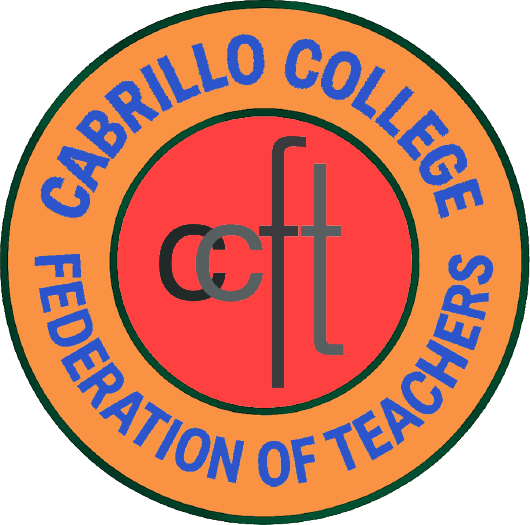A new interim ACCJC President spoke before the Community College Council at the CFT Convention in April. Dr. Richard Winn struck an amicable note in his seemingly apologetic comments and then took questions from the crowd for several hours. Winn sounded good on many points. As former CFT President Martin Hittelman notes, key among these points were: ACCJC will not impede on collective bargaining issues such as evaluation procedures, salary rates, or pre-funding of retirement benefits; more faculty will be on visiting teams and there will be a more open process of picking visiting team members; and the Student Learning Outcomes paradigm is not an appropriate area of emphasis and will hopefully soon be phased out. So with Barbara Beno gone as head of the ACCJC, it appears to be a new day. Using elements from Martin Hittelman’s epic study of ACCJC, “ACCJC Gone Wild,” I produce a preliminary balance sheet of early 2017 below.
New Year Victories and Continuing Signs of Trouble
In January, ACCJC accredited City College San Francisco for a full seven years. This true milestone in the struggle for CCSF was greeted with celebration across the state. Coupled with the departure of Beno, things were looking up. It was the strength of Local 2121 and the statewide union that pulled this victory from the jaws of defeat. CFT continues to push its ACCJC reform-oriented lawsuit in the courts. Active membership plus the political and legal clout of a large, statewide union have proved to be a potent combination, even capable of putting ACCJC on its back foot while displacing its seemingly untouchable former President.
But those same January days saw fifteen other schools receive some sort of sanction, warning, or limited period of accreditation. Monterey Pacific College received probation, while Santa Monica College and San Jose City College received 18-month accreditation. These new sanctions continue the pattern of punitive behavior on the part of ACCJC; sanctions will cost schools substantial resources, as they mobilize staff and faculty to deal with accreditation teams yet again. So while an olive branch has been extended to CCSF, the way of the gun remains part of the dynamic for ACCJC in the California Community College system. In February, the Federal Department of Education’s National Advisory Committee on Instiutional Quality and Integrity (NACIQI) granted ACCJC another 18 months as an accreditor; it also claimed that ACCJC was not violating any federal regulations.
More recently ACCJC held a “conference” in Southern California. The April, post-CFT Convention event featured several deeply problematic panels, including one called “Do Teachers Have a Prima Donna Complex?” This panel purported to take on the non-existent problem. Another “conference” session included a discussion of “a Ph.D. dissertation by Megan Corry at San Francisco State University under the faculty leadership of former CCSF administrator Robert Gabriner,” as Hittelman notes. The dissertation went out of its way to indict CCSF “culture” of being everything to all people as the main culprit for the woes connected to CCSF’s accreditation fight. Corry’s dissertation states:
“Through interviews and archival document review, this study found that college leaders consistently normalized deviations in financial operations and in decision-making processes on student learning outcomes. Three factors that contributed to normalization of deviance included an environment of competition for scarce resources stemming from shifts in state community college finance laws and increasing accountability standards, a culture of expectation to be “all things to all people”, and a self-affirming ideology fed by a culture of “uniqueness”, which isolated the institution and insulated its leaders from acting on the warning signs of impending crisis.” (Quoted in Hittelman.)
The dissertation flatly refuses to acknowledge the ACCJC’s own dubious practices as the main culprit of the crisis. Hittelman: “It appears that the author had her own ‘self-affirming ideology.’ ”
The ACCJC conference had numerous sponsors, and all are concerned to squeeze profits out of higher education. Most of the companies are involved in student performance tracking software and job placement. A partial list includes: Nuventive, LiveText, interfolio, the RP group, eLumen, taskstream, EDUNAV. The corporatization of higher education is a complex front in the investor-driven education privatization movement. ACCJC is a preferred “get tough” vehicle for investor interests. As Hittelman’s analysis of the student loan industry’s Lumina Foundation shows, ACCJC has long had a strong relationship with the corporate world.
Roots of the Accreditation Crisis
Many of the developments with ACCJC can be chalked up to a systematic attempt to privatize public education by forcing students out of the public community college system and into the hands of private schools and their student loan company operators. This was the conclusion of a 2014/15 study by a group of researchers at CCSF. As they note, “The flip side [of the growth in for-profit colleges and the student loan industry] is sharply declining public funding for California community colleges, and aggressive hyper-regulation by the ACCJC” (quoted in “The Corporate Roots of the Attack on Community Colleges,” David Bacon, CCC Perspective, Feb 2015).
A key moment in the privatization struggle came when George W. Bush administration officials—people like Margaret Spellings and Sally Stroup, respectively the former Secretary of Education and former assistant secretary of education appointed by President George W. Bush—took lucrative payoffs when they went to work as lobbyists or corporate education officials in 2008. Spellings in particular pushed the infamous SLOs, which David Bacon calls “the groundwork for the introduction of standardized testing in the community college setting, through the Degree Qualifications Profile—a standardized curriculum framework now under development, similar to the Common Core in K-12.” Bacon links the ACCJC’s emphasis on SLOs to the politics surrounding the attack on CCSF. “Lack of “sufficient progress” on SLOs,” he writes, “was a major ACCJC criticism of City College of San Francisco.” Under former-Secretary-now-lobbyist Spellings, the Department of Education made crucial changes to the obscure two-year rule, a major point with ACCJC’s attempt to close CCSF.
The Democrats haven’t done much better. In 2008 and 2009 when there was momentum for some reforms to the student loan and for-profit college industry, high profile officials effectively derailed it. Tony Podesta, brother of John Podesta, who headed President Obama’s transition team in 2008 and the Clinton Campaign in 2016, and Dick Gephardt, former Democratic House leader and presidential candidate, both lobbied against key protections.
We need to keep this history in mind in the coming months and while interim-President Dr. Winn’s words have certainly changed, the presentations at the ACCJC conference and its sponsors have not. We look to the current CFT lawsuit, which may lead to real action and bold reforms of ACCJC. It was the union power of CFT that fought ACCJC and won. It will take a strong CFT to challenge and defeat the privatization movement when it manifests itself again in the years ahead. Hittelman and others still call for a new accreditor.









